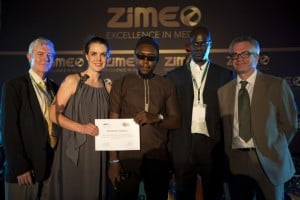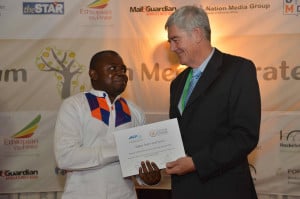In 2023, we received 236 entries from 24 African countries. We expect even more in 2024.
The African Fact-Checking Awards, the longest-running awards programme honouring fact-checking journalism by the media in Africa, are in their eleventh year.
Entries for the 2024 awards are now open to journalists, journalism students, and professional fact-checkers – across the continent.
To qualify, entries must have been first published or broadcast in the period from 1 July 2023 to 14 July 2024. The fact-check should conclude that a claim about an important topic, originating in or relevant to Africa, is either misleading or wrong.
The awards have three categories, with honours going to a winner and a runner-up. The categories are:
- Fact-Check of the Year by a Working Journalist
- Fact-Check of the Year by a Professional Fact-Checker
- Fact-Check of the Year by a Student Journalist
The winners of the working journalist and professional fact-checker categories will each get a prize of US$3,000. The runners-up will receive $1,500. The winner of the student journalist category will be awarded $2,000, and the runner-up $1,000.
Entries close at midnight GMT on 14 July 2024.
Terms and conditions
To be eligible, entries for this competition must:
-
Be the original work of the individual or team identified in the entry form as the author.
-
Expose a claim on an important topic that originated in or is relevant to Africa as misleading or wrong.
-
Be an original piece of fact-checking journalism first published or broadcast on any date from 1 July 2023 to 14 July 2024.
-
Be received by the organisers before midnight GMT on 14 July 2023. Late entries will not be accepted.
-
Be received by the organisers via the official entry form. No other means of sending in entries is allowed.
-
Fact-checks can be published/broadcast in any language, but entry forms must be completed in either English or French. However, should the fact-checking report not be in English or French, a written translation must be submitted with the entry.
-
By submitting an entry, the entrant confirms that they are the authors of the work, and that in the case of any dispute about this, this is entirely the entrant's responsibility
-
Reports published by Africa Check are not eligible for the competition.
-
Judges reserve the right to move an entry from one category to another.
-
Candidates can only enter for the awards in one category per year, but can submit more than one report if they choose.
-
Should the entrant win a prize in the awards, we will send the money to a bank account to be nominated by them.
-
At the shortlisting stage a representative of the jury may seek clarification on some points.
-
Entrants who are found to be unethical about any aspect related to their entry will be disqualified.
-
Entrants must agree to do media interviews and/or reports about the awards if they win.
-
Entrants for the awards must agree to accept the judges' decision as final.
Category: Fact-Check of the Year by a Working Journalist
-
Only journalists who do not work for fact-checking organisations are eligible to enter in this category.
-
The entry must have been published or broadcast for the first time by a media- or independent fact-checking organisation based in Africa on any date from 1 July 2023 to 14 July 2024.
-
The work may be published in print or online, broadcast on the radio or television, or published in a blog.
Category: Fact-Check of the Year by a Professional Fact-Checker
-
Journalists, fact-checkers or researchers who work for fact-checking organisations or organisations aimed at uncovering dis- or misinformation must enter in this category.
-
The entry must have been published or broadcast for the first time by a media- or independent fact-checking organisation based in Africa on any date from 1 July 2023 to 14 July 2024.
-
The work may be published in print or online, broadcast on the radio or television, or published in a blog.
Category: Fact-Check of the Year by a Student Journalist
-
To enter the student category, candidates must be from Africa and younger than 35 by 14 July 2014.
-
Student candidates must have been enrolled as a student at a university, college or other tertiary institution at some period from 1 July 2023 to 14 July 2024.
-
This category excludes part-time students who are working as professional fact-checkers or journalists. Such candidates must enter one of the other two categories.
-
The entry must be an original piece of fact-checking journalism, produced as course work or first published or broadcast on any date from 1 July 2023 to 14 July 2024.
-
The work may be published in a blog, student publication or by a media- or independent fact-checking organisation based in Africa.
-
Judges reserve the right to move an entry from one category to another.
-
Candidates can only enter for the awards in one category per year, but can submit more than one report if they choose.
Entries are judged based on the following criteria:
Significance
The significance for wider society of the claim/statement investigated. How much does the topic matter to society at large and how serious could the consequences be if the claim wasn't fact-checked?
Testing
How was the claim tested against the available evidence? Fact-checkers must take a long, hard look at the claim/statement that was made. Fact-checking entails rigorously sifting through the publicly available evidence for and against the claim. This should be done in a way that is fair to the person or institution who made the claim and strict in assessing the evidence.
Presentation
How well does the piece present the evidence for and against the claim? A good fact-checking report is structured in such a way that it's understandable and makes the topic accessible to the widest possible public.
Impact
The impact that the fact-check had on public debate on the topic. Did it lead to a correction, did it have significant reach, or was it shared by other organisations or members of the media, for instance?
Previous winners
2023
The Africa Facts summit held in Port Louis, Mauritius was brought to a celebratory end with the Awards gala dinner, which announced the winners and runners-up of this year’s African Fact-Checking Awards.
Winners
- Fact-Check of the Year by a Working Journalist: Moussa Ngom, La Maison Des Reporters, & Laureline Savoye, Le Monde Afrique, "Sénégal : enquête sur les « nervis du pouvoir »”
- Fact Check of the Year by a Professional Fact Checker: James Okong'o & Mary Kulundu, AFP Fact Check, “Kenya police misleadingly use old protest photos in online hunt for March 2023 rally participants”
- Fact-Check of the Year by a Student Journalist: Papa Bocar Mbow, CESTI, “Mbeubeuss est-elle la plus grande décharge à ciel ouvert d'Afrique?”
Runners-up
- Fact-Check of the Year by a Working Journalist: Claire Mom, TheCable, “How fake anonymous Facebook accounts spread disinformation and incite violence”
- Fact Check of the Year by a Professional Fact Checker: Kemi Busari, Dubawa, “Baba Aisha, Nigeria’s fake ‘doctor’ cashing out on deadly concoction that cures nothing”
- Fact-Check of the Year by a Student Journalist: Komagal Chocalingum, Georges Aurore & Permalloo Suhaasinee, University of Mauritius, “Will employees really get a minimum wage of Rs 15,000 or will they only get Rs 12,750 due to taxes?”
2022
The Africa Facts summit held in Nairobi, Kenya concluded with the African Fact-Checking Awards on Thursday 10 November 2022, with fact checkers from Nigeria, Ghana, Kenya and Mauritius taking top honours. We received more than 190 entries from 24 countries this year and we continue to see a rise in the quality of entries.
Winners
- Fact-Check of the Year by a Working Journalist: Kunle Adebajo, HumAngle in Nigeria, "Factcheck: Russia Claims U.S. Is Making Bioweapons In Nigeria. True?"
- Fact Check of the Year by a Professional Fact Checker: Jonas Nyabor, Dubawa Ghana, "Unmasking the faces behind the COVID-19 anti-vaccination campaign in Ghana"
- Fact-Check of the Year by a Student Journalist: Vidyasharita Bumma, Kokeelavani Mauree and Sachita Gobeen, University of Mauritius, "A Mauritian media organisation published an article containing misleading claims on vaccination for children"
Runners-up
- Fact-Check of the Year by a Working Journalist: Kabir Yusuf, Premium Times in Nigeria, "FACT-CHECK: How true is Buhari’s claim that Nigeria is better off today than in 2015?"
- Fact Check of the Year by a Professional Fact Checker: James Okong'o, AFP Fact Check, "False political quotes fuel online disinformation ahead of Kenya election"
- Fact-Check of the Year by a Student Journalist: Elizabeth Henri-Héloïse, University of Mauritius, "La hausse du prix des carburants à Maurice : est-ce qu’il y a eu une hausse de 140% ?"
2021
We received a record number of 216 entries from 28 countries.
Winners
- Fact-Check of the Year by a Working Journalist: Jean le Roux, DFRLab South Africa: “Nigerian army dismisses Lekki Toll Gate massacre as ‘fake news’”
- Fact-Check of the Year by a Student Journalist: Reagan Kiyimba, Makerere University in Uganda: “#TheDebunkShow Episode 4 | #COVID19 cure joy”
Runners-up
- Fact-Check of the Year by a Working Journalist: Oluwasegun Olakoyenikan, AFP Fact Check Nigeria: “False EU statement about rescue of kidnapped kids circulates in Nigeria”
- Fact-Check of the Year by a Student Journalist: Fatma Mbacké, CESTI journalism school in Senegal: « Le Ghana a-t-il arrêté ses exportations de cacao vers l'Europe ? »
2020
We received a record number of 192 entries from 27 African countries in 2020.
Winners
- Fact-Check of the Year by a Working Journalist: Taiwo Adebulu “FACT CHECK: Nigeria told UN that 7 varsities run strictly on renewable energy, but is this true?”
- Fact-Check of the Year by a Student Journalist: Marième Fatou Dramé “Une organisation féministe publie des informations trompeuses sur les jeunes filles sénégalaises ( absentéisme scolaire, gestion des règles)”
Runners-up
- Fact-Check of the Year by a Working Journalist: Aisha Abdool Karim “The coronavirus ‘vaccine’ Ekurhuleni wants to import doesn’t exist”
- Fact-Check of the Year by a Student Journalist: Oluwaseye Ogunsanya “Did Nigeria’s Minister Of Education Announce Resumption of Schools On September 7?”
2019
We received a total of 153 entries from more than 20 countries all across the continent – from Ethiopia, Nigeria and Senegal to Egypt, South Africa and Zimbabwe.
Winners
- Best fact-checking report by a working journalist: Odinaka Anudu, BDSunday, “Ongoing projects in South East: Truth vs lies”, Nigeria
- Best fact-checking report by a student journalist: Souleymane Diassy, CESTI – Centre d’Etudes des Sciences et Techniques de l’Information, « Santé : Kolda a-t-elle le plus grand ratio de mortalité maternelle au Sénégal ? », Senegal
Runner-ups
- Best fact-checking report by a working journalist: Oluwamayowa Tijani, AFP Fact Check, “A minister claimed that Nigeria has ‘more than enough’ doctors. In fact, there’s a huge shortage”, Nigeria
- Best fact-checking report by a student journalist: Dieynaba Thiombane, CESTI – Centre d’Etudes des Sciences et Techniques de l’Information, « Santé : Le taux de prévalence du VIH/Sida est-il passé de 18 à 20% entre 2014 et 2017 chez les homosexuels au Sénégal ? », Senegal
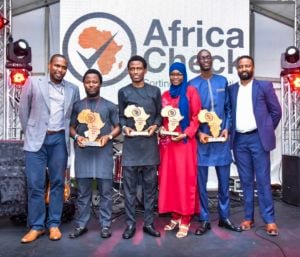
2018
We received over 150 entries from more than 20 countries, from Ethiopia, Nigeria and Egypt to South Africa and Zimbabwe.
Winners
- Best fact-checking report by a working journalist: Chikezie Omeje, International Centre For Investigative Reporting (ICIR), “FACT CHECK: Did Nigeria record a reduction in preschool enrolment?”, Nigeria
- Best fact-checking report by a student journalist: Moussa Ngom, CESTI, “Dakar n’est pas la deuxième ville au monde la plus polluée”, Senegal
Runners-up
- Best fact-checking report by a working journalist: Jason Norwood-Young, Daily Maverick, “#CapeWaterGate: The figures prove that Capetonians are saving water”, South Africa
- Best fact-checking report by a student journalist: Ibraheem Alawode, Dubawa, “Does Nigeria Have The Highest Number Of Out-Of-School Children In The World?”, Nigeria
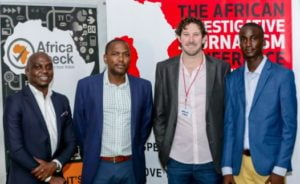
2017
In 2017, we received a record number of applications – 159 entries from 25 countries – from Ethiopia and Egypt in the north to South Africa and Zimbabwe in the south, before entries closed on 31 August.
Winners
- Best fact-checking report by a working journalist (English-language): Dorothy Otieno (on behalf of Nation Newsplex Team), Before you vote, Nation Media Group, Kenya
- Best fact-checking report by a working journalist (French-language): Alexandra Djotan, MAG La Libération Forcée Des Emprises Du Domaine Public Fait Des Million De Victimes, Radio Parakou, Benin
- Best fact-checking report by a student journalist (English or French): Moussa Ngom, Pourquoi Macron a tout faux…, attending CESTI, Senegal
Runners-up
- Best fact-checking report by a working journalist (English-language): Arison Tamfu, FEATURE: As Paul Biya Looks to Running Again in 2018, Has He delivered on his 2011 electoral promises?, Cameroon Journal, Cameroon
- Best fact-checking report by a working journalist (French-language): Nesmon de Laure Pie, Décryptage- Naissances élevées, les experts s’affrontent, » l’Afrique peut avaler ses populations », PôleAfrique.info, Côte d’Ivoire
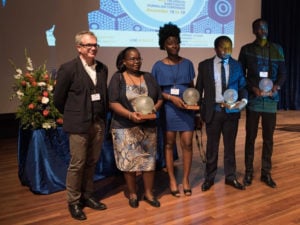
2016
After reviewing 130 entries from 22 countries the judges selected the following:
Winners
- Best fact-checking report by a working journalist (English-language): Arison Tamfu, The Many Falsehoods in President Biya’s Laptop Gift to University Students, Cameroon Journal, Cameroon.
- Best fact-checking report by a working journalist (French-language): Anderson Diédri, The Ivorian State plunders 11,000 hectares of land in Famienkro, Eburnietoday.com, Côte d’Ivoire.
Runners-up
- Phathizwe Mongezi Zulu, Lies, public money and a redone DC-9 in Swaziland, AmaBhungane and GroundUp websites, Swaziland
- Dayo Oketola, NigComSat-1R becoming white elephant four years after – investigation, Punch Newspaper, Nigeria
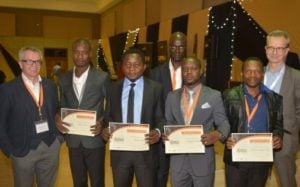
2015
After entries from more than 50 journalists in 15 countries, the jury selected the below winners and runners-up:
Winner
- Best fact-checking report: Ben Ezeamalu, Premium Times, Nigeria
Runners-up
- Phillip de Wet, Mail & Guardian, South Africa
- Pieter-Louis Myburgh, Rapport/City Press, South Africa
